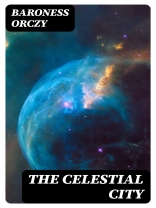In ‘The Celestial City, ‘ Baroness Orczy crafts a captivating narrative that explores themes of love, sacrifice, and redemption against a backdrop of fantastical elements. The novel embodies a rich literary style characterized by vivid imagery and lyrical prose, transporting readers to a whimsical realm where the boundaries between reality and imagination blur. Set during a time of societal upheaval, Orczy skillfully weaves together elements of adventure and moral philosophy, inviting readers to ponder the deeper meanings of existence and the quest for a utopian ideal. Baroness Orczy, a Hungarian-born British author best known for her creation of the iconic character the Scarlet Pimpernel, drew upon her unique cultural heritage and a profound understanding of human motivations in crafting this tale. Having lived through the trials of her time, Orczy’s experiences and her interest in the intricacies of human relationships inform the intricate character development in ‘The Celestial City.’ Her penchant for blending romance with social commentary highlights her ambition to challenge the prevailing norms of her era. This enchanting novel is highly recommended for readers who delight in exploring the nuances of character and moral dilemmas within a fantastical setting. Orczy’s ability to connect the ethereal with the profound makes ‘The Celestial City’ a thought-provoking read that resonates with anyone seeking a deeper appreciation of the human experience.
About the author
Baroness Emma Orczy, born Emma Magdalena Rosalia Maria Josefa Barbara Orczy on September 23, 1865, in Tarnaörs, Hungary, was a distinguished playwright and author of classic adventure fiction. Best known for her novel ‘The Scarlet Pimpernel’ (1905), Orczy carved a unique space for herself in the early 20th-century literature through her thrilling plots and compelling characters. Orczy’s foray into literature blossomed after her family moved to London, where she attended the West London School of Art and later the Heatherley School of Fine Art. The Baroness’s works often encapsulated aristocratic life and featured themes of adventure, espionage, and romance set in historical contexts. ‘The Celestial City’ is among the notable mentions in Orczy’s impressive bibliography. Although it may not have gained the same enduring fame as ‘The Scarlet Pimpernel, ‘ it nonetheless showcases her grand literary style and her ability to intricately weave narratives alongside historical settings. Orczy’s writing is characterized by its vivid storytelling, imbued with a sense of boldness and idiosyncratic flair that resonated deeply with her contemporary audience and continues to captivate readers today. She passed away on November 12, 1947, in Henley-on-Thames, England, leaving behind a rich legacy that secures her place in the pantheon of literary history.












